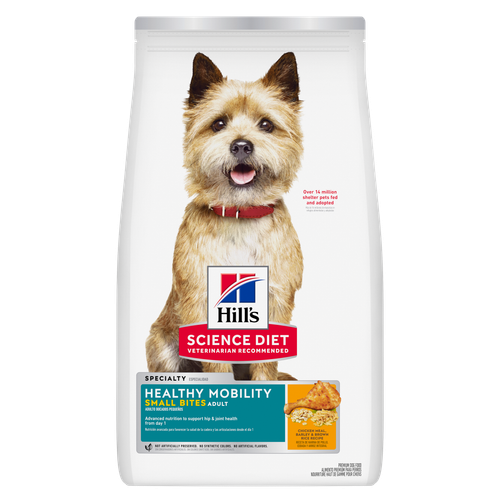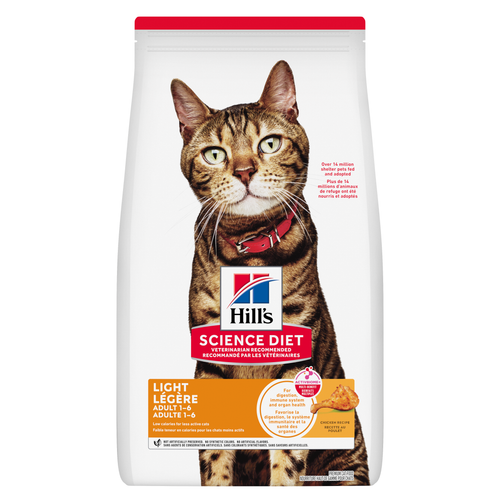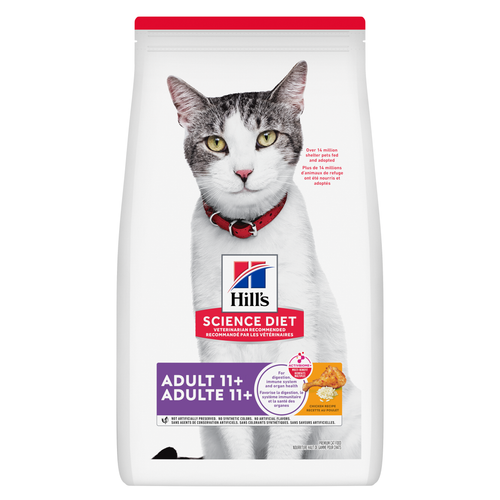
-
Find the right food for your petTake this quiz to see which food may be the best for your furry friend.Find the right food for your petTake this quiz to see which food may be the best for your furry friend.Featured products
 Adult Healthy Mobility Small Bites Chicken Meal, Barley & Brown Rice Recipe Dog Food
Adult Healthy Mobility Small Bites Chicken Meal, Barley & Brown Rice Recipe Dog FoodAdvanced nutrition to support hip & joint health from day 1
Shop Now Adult Light Large Breed Chicken Meal & Barley Recipe Dog Food
Adult Light Large Breed Chicken Meal & Barley Recipe Dog Food18% lower calories vs. Science Diet Large Breed Adult
Shop Now Adult Sensitive Stomach & Skin Small & Mini Chicken Recipe Dog Food
Adult Sensitive Stomach & Skin Small & Mini Chicken Recipe Dog FoodHill's Science Diet Sensitive Stomach & Skin Small & Mini dry dog food is tailored nutrition for Small & Mini dogs while being gentle on stomachs. Nourishes skin & promotes a lustrous coat.
Shop NowFeatured products Adult Healthy Cuisine Seared Tuna & Carrot Medley Cat Food
Adult Healthy Cuisine Seared Tuna & Carrot Medley Cat FoodDelicious seared tuna paired with tender carrots in a mouthwatering sauce
Shop Now Adult Light Chicken Recipe Cat Food
Adult Light Chicken Recipe Cat Food20% lower calories vs. Hill's Science Diet Adult
Shop Now Adult 11+ Chicken Recipe Cat Food
Adult 11+ Chicken Recipe Cat FoodSupports brain health & beautiful fur. Helps keep immune system, heart & kidneys healthy.
Shop Now -
Dog
- Dog Tips & Articles
-
Health Category
- Weight
- Food & Environmental Sensitivities
- Urinary
- Digestive
- Joint
- Kidney
- Dental
- Cancer
-
Life Stage
- Puppy Nutrition
- Adult Nutrition
- Senior Nutrition
Cat- Cat Tips & Articles
-
Health Category
- Weight
- Skin & Food Sensitivities
- Urinary
- Digestive
- Kidney
- Dental
- Stress
- Cancer
-
Life Stage
- Kitten Nutrition
- Adult Nutrition
Featured articles Importance of DHA in your Pet's Food
Importance of DHA in your Pet's FoodLearn about DHA, Docosahexaenoic Acid, a natural omega-3 fatty acid that is essential in the development of the brain and nervous system in cats & dogs.
Read More Water
WaterDiscover why water is the most important nutrient for your dog or cat to live a healthy life. Find out how much water your pet should consume each day.
Read More Antioxidants
AntioxidantsUnderstand the importance of antioxidants in your dog or cat's food, and how they can help protect your pet and keep them healthy.
Read More -


If you find yourself worrying about finding a lump on your dog or wondering what the lump under your dog's skin is, try not to panic — there are many possible causes for lumps on your pet. While dogs can develop cancerous tumors, if you find a growth on your dog's skin, many are treatable. A lump or bump can even be as simple as an inflamed hair follicle.
The most important thing for you to do is stay alert to any lumps on your pooch and let your veterinarian know about them; that way, they can determine if treatment is necessary.
Key Takeaways
-
If you notice a lump on your dog, it’s important to keep track of it and if it changes over time.
-
The most common types of lumps are skin growths and skin tumors, both of which usually have treatment options.
-
If you are concerned about a potential lump on your dog, contact your veterinarian for advice.
How Do I Monitor a Bump on My Dog?
Skin tumors are the most commonly seen tumor in dogs, reports the Merck Veterinary Manual. By regularly examining your dog's skin, you can take a lead role in caring for their health. Establish a weekly routine of inspecting your dog from the tip of their nose to the end of their tail. Make sure to hone in on commonly overlooked spots, like between the toes, under the tail and even in your dog's mouth — if they're cooperative. Chances are your pooch will enjoy these extra pets and rubs.
If you find a mass on your dog, make sure to note where it is, and not just mentally. Grab your phone to snap a quick photo or two. A dog's lumps and bumps can change over time, and keeping a log of their locations and sizes will help your vet more effectively manage your dog's health.
Diagnosing a Lump on My Dog
"What should I do if I find a lump on my dog?" It's a common question pet parents ask. The best thing you can do if you discover a bump on your dog is to schedule an appointment with the vet. While Dr. Google provides a wealth of pet health information, it's easy to go down a rabbit hole of misinformation and panic. Instead, go straight to the expert. Even if your dog is due for an exam in a few months, don't wait. Even noncancerous masses can worsen and get infected if you wait too long to bring your dog in for treatment.
Your vet will need to take some tests to accurately diagnose your dog's lump. They may recommend a fine needle aspirate and cytology — one of the least invasive procedures to evaluate a lump or bump, during which a vet uses a small needle to collect cells. The cells are placed on glass slides and stained for microscopic review. Depending on the type of mass, the vet may be able to diagnose it quickly. Or, your vet may send out the slides to a laboratory to have them reviewed by a specialist.


Tasty Tips
Since our first pet food in the late 1930s, we’ve set out to create differences you can see, feel and trust.
Common Types of Lumps on Dogs
As Petco mentions, lumps or bumps can often be categorized into two classifications: skin growths and tumors.
Types of Skin Growths in Dogs
A skin growth is a benign (non-cancerous) lump of tissue that projects out from the surrounding skin. Below are some of the more common skin growths on dogs:
- Abscesses: These are lumps that form as a result of an infection from a bite, wound or foreign object. They are often painful and can contain large amounts of blood and pus with the possibility of rupturing.
- Apocrine Cysts: These cysts are caused by obstructed skin glands. Think of them much like a human pimple. They may also rupture, which often helps clear them up.
- Hematomas: These occur when blood accumulates beneath the skin following a trauma. These too can be painful for your dog.
- Injection-Site Reactions: Following an injection, your dog may develop a small knot beneath the skin. These can be tender, but often fade within a couple of days or weeks.
- Hives and Other Allergic Reactions: Hives are itchy, swollen pockets of skin as the result of allergic reaction. Other types of bumps can form from different types of allergic reactions.
Types of Skin Tumors in Dogs
The word tumor is one of the scariest words a pet parent can hear. However, not all tumors are cancerous, and even those that are can still be treated. A tumor, simply, is a mass of tissue that forms as the result of the accumulation of abnormal cells. Read on to learn about some of the different types of tumors and where they might form on your dog's body:
- Histiocytomas: These small, hard and dome shaped benign growths often appear in younger dogs on their head, ear flaps or legs. They can often disappear, even without treatment.
- Lipomas: These are most commonly found in overweight dogs — they are benign tumors consisting of soft and smooth clumps of fat cells that can grow very large, found most often around the chest, abdomen and front legs.
- Sebaceous Gland Hyperplasia: This type of tumor forms when the glands that secrete sebum (the oily substance that lubricates your dogs skin) grows rapidly. These are also benign tumors that have a wart-like appearance often found on your dog's legs, torso or eyelids.
- Malignant Skin Tumors: These types of tumors are cancerous, and appear as noticeable lumps or sores on the skin that won't heal. The most common type of malignant skin tumors are mast cell tumors. Early detection is key to keeping your dog happy and healthy.

Skin tumors are the most commonly seen tumor in dogs.
Can a Skin Lump or Tumor Be Treated?
After the lump is diagnosed, your vet will walk you through your treatment options. Know that even when a mass is diagnosed as cancer, your dog can have a great outcome if the lump is treated early and aggressively. Proper nutrition may help manage (and prevent) mild skin bumps and irritation. The right balance of essential fatty acids in dog food can calm sensitive skin and support healthy skin and a shiny coat.
The key to a positive outcome is early treatment, and early treatment can't happen without early detection. If you find a bump, take a picture, note when it appeared and take your dog in to see the vet. The power to help your dog live a longer, healthier life is at your fingertips.


Dr. Laci Schaible is a small animal veterinarian, veterinary journalist, and a thought leader in the industry. She received her Doctor of Veterinary Medicine from Texas A&M University and her Masters in Legal Studies from Wake Forest University.

See what Vets have to say
Read reviews from the experts and see why Hill's is the #1 Veterinarian Recommended brand.
See what Vets have to say
Read reviews from the experts and see why Hill's is the #1 Veterinarian Recommended brand.




